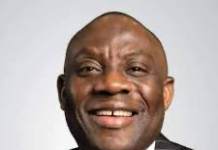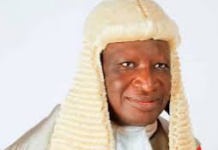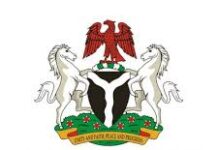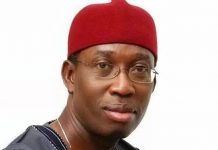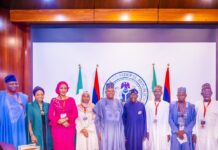The Ibrahim Agboola Gambari That I Know, By Babafemi A. Badejo
On May 12, news leaked that Ibrahim Agboola Gambari, a quintessential and consummate bilateral and multilateral diplomat, had been appointed as the chief of staff (CoS) to President Muhammadu Buhari of Nigeria. I tried to reach him to congratulate him on this, but the number I had just rang till the normal disappointing announcement that asks to try later. So, I passed my greetings through a mutual friend, who I know would deliver this. That was it for me.
Then I started receiving congratulatory messages on the appointment of my benefactor from friends who knew that I know the new CoS. That’s not a problem. Three of the messages wasted no time in requesting that I ensure they get plum jobs. Then, in the evening, one of my classmates from my Ijebu-Ode Grammar School days posted a much circulated reaction of Ambassador Dapo Fafowora on the Gambari appointment that was yet to be announced. I read it with deep interest. Unfortunately, I had not read Ambassador Fafowora’s book, Lest I Forget, but his positive diplomatic pedigree and intellect I had heard much about and had listened to him speak impressively at one or two gatherings. I wrote on my classmates’ WhatsApp platform to the effect that Professor Ibrahim Agboola Gambari changed my life (and indirectly the lives of many through me). This is no news, as anyone close to me would have heard of this in the past. I retorted that they must wait for whenever I am able to write my memoir, if I ever write one. They have known me from about the age of 12 and understand that I will not be seeking a job or contract for myself, not to talk of for anyone else.
I woke up on the morning of May 13 feeling I must tell a bit of the Ibrahim Agboola Gambari part of my story. As I read more accounts during the day, I received two different calls from a senior and a friend, and became more convinced that I should make some part of my dream of a memoir public presently. My write-up, this time around, is limited to my story of the Ibrahim Agboola Gambari that I know.
Retired General David Jemibewon as a graduate student at the University of Lagos (UNILAG) took a course that I taught. We got to like each other, and I indicated interest in having international experience. He then wrote a beautiful letter about me to Professor Gambari, who was then the permanent representative of Nigeria to the United Nations. I had tried to corner Gambari’s predecessor, late General Joe Garba, at an anti-Apartheid meeting in Lagos. I was an activist in those days. I was pushed aside by the security guys.
So, it was a big surprise that Professor Gambari arrived in Lagos and called on my epileptic NITEL phone line, asking myself and my wife to join him for breakfast at the Federal Government Guest House on Victoria Island. I wonder what became of all those villas that the country had at independence. Like the Federal Palace Hotel that Ibrahim Babangida and his deputy, late Augustus Aikhomu, claimed to have sold on credit many moons ago, I wonder what had been the final stories on all those claims of privatisation that distributed the national patrimony to the most favoured for pittance.
I had been told by another friend who knew late General Tunde Idiagbon and Professor Gambari very closely as kids in Ilorin, that his mother was a Yoruba woman. So, I had my Yoruba manners on but was shocked when he kept using the Yoruba equivalent of “vous” in French for me. That should not be the case for Yorubas, since he was much older. I was later to know that that’s just him. Till date, that has remained his unassuming humility towards all. He told me he had just resumed in New York and would look at what could be possible on my desire to work for the UN.
That was it. However, as things would turn out, I became the local fulcrum for the quest of General Olusegun Obasanjo to become the UN secretary-general, which later failed. Dr. Hans D’Orville, who had insisted that I should be the local leader in Nigeria, was the international fulcrum. Late Professor Ade Adefuye, my big brother from my first day at UNILAG, as the first faculty member I met and whose young age became an inspiration, agreed to be coopted. The federal government, about August 1991, appointed me as special assistant to General Obasanjo on his quest to be the secretary-general. My own assessment was that the federal government was not really interested in General Obasanjo becoming secretary-general of the UN but still President Babangida put some money behind the race. Obasanjo had been rightly very critical of the conditionalities that the International Monetary Fund (IMF) had imposed on Nigeria after the patriotic Buhari/Idiagbon regime was overthrown by Babangida under the auspices of the West, with some local support from the likes of his one-time friend, late MKO Abiola.
Read Also:
With the assistance of my friend, Professor Duro Oni, who was a ministerial special assistant, the bureaucracy worked. I received my Nigerian Airways ticket and I went on to New York, initially for a month, on the basis of my appointment letter. But the main beneficiary on the budget head, General Olusegun Obasanjo reduced my stay to two weeks. Professor Gambari intervened, stressing that he needed my assistance in New York. So, I started getting weekly extensions from General Obasanjo, after phone calls from Ambassador Gambari to the General. This continued till the end of the race, about eight weeks from my arrival date. We had several straw polls to reduce the 11 Africans in the race to a manageable number. The Nigerian ambassadors who were in the General Assembly delegation of Nigeria showed little interest, with the exception of Ambassador Ayo Azikiwe, who constantly stayed by me as we waited by the Security Council for results of the polls. General Obasanjo decided not to withdraw and asked us to steadfastly stay till the end, although it was clear that we would not make it.
It is history that we worked very hard. Professor Gambari remained loyal to his brief, in spite of minimal support from home. The British and the French refused to accept Olusegun Obasanjo, with one of them telling Professor Gambari and myself that they want a secretary and not a General. We lost the post to another African – Boutros Boutros-Ghali. At least Babangida could see it as a success since, as the president of the Organisation of African Unity at the time, Africa succeeded in getting an African, even if the Arab world appropriated him the day after the election, as an Arab candidate. In addition, Babangida had cut his towering former boss, who dared to want to zoom to the world stage, to size.
This assignment boosted my relationship with Professor Gambari, who started treating me like a younger brother. He was very religious and at the same time liberal and very tolerant of the foibles of people like me, who lacked the discipline of religious precepts. So, I had no reservation to write to him that I was going to a conference in South Carolina in late 1992 and asked if I could stop to see him in New York on my way back to Nigeria. I requested for accommodation assistance. It was at this meeting that Professor Gambari told me that the secretary-general (Boutros-Ghali) had written to the Federal Government of Nigeria asking for the nomination of three Nigerians, of which at least one should be a female, to join the United Nations. He gave me the appropriate form for seeking a job with the UN and asked me to fill and return this to Abdullahi Omaki, who was his special assistant. Abdullahi later became Nigeria’s ambassador to Chad and consul-general in Equatorial Guinea.
Professor Gambari informed me that he could not nominate anyone and must wait for nominations from home. However, he let me know that he was certain from experience that the Ministry of External Affairs would not respond by the deadline. He knew that the politics of whose brother/sister, as well as the infamous federal character principle that tended to paralyse such decisions on who would be seconded and/or compete for political posts at the international level, would affect it. He assured me that he would submit my application as one of three interested Nigerians after the deadline. He encouraged me that he was certain that I would do well at the recruitment interview. If the Ministry of External Affairs had done the nominations, there would have been no need for a competitive interview. In effect, Professor Gambari used his personal influence to ensure that I joined the several applicants from all over the World.
I succeeded at the interview that was conducted by the UNDP Country Office in Lagos, on behalf of the UN Secretariat. However, I was not amused when I was told that the job was in Somalia. At that time, furious fighting was going on in Somalia, where people were being killed on a regular basis. My first daughter, as a young girl, could hear about people being killed on CNN, which was free at the time. She was sad and asked why I wanted to go and die. I responded that if I died, they would receive a $250,000 death insurance and when they are spending it, they should remember that I died so that they may live.
I arrived Mogadishu, thinking I would only spend six months and return to my academic post and practice of law on the side to survive. While in Mogadishu, I met the late McIver. I do not remember his first name. I think it was an English name, as well as Kayode or so. With his surname, one would have thought he was from Great Britain. But he was actually a Yoruba man from Kwara State of Nigeria. We became very good friends. He subsequently told me that he was the second person nominated by Professor Gambari. Till today, I do not know the third Nigerian, who must have been a lady.
As for my time at the UN, it was not a stay of six months as I had initially convinced my wife, but one of 23 years and 10 months. I was lucky that I did not die in service but survived two bombs in Mogadishu and a kidnap attempt in Darfur during my UN career.
I wish Ambassador Gambari all the very best in the challenges he will face. He has the experience to bring a lot to the table with respect to best practices from all over the world, to arrest the cascading downward move of our dear nation. I recollect that he gave a beautiful and balanced speech at Mai Zube farms last July, when General Abdulsalami Abubakar invited him to chair the meeting on the way forward to achieve safety and security in Nigeria. He only needs to re-read that speech and be guided by some of the suggestions at that meeting, including those that did not make it into the communique. It is an almost impossible time to be a CoS. All eyes and many hopes are on him towards assisting the elected leadership to focus on the insecurity that we face, aside from handling the transition from crisis into a necessary transition, before talking of the post-COVID-19 challenges that our country will face.
The comments of those who have been unsatisfied with Professor Gambari’s appointment should only ginger him to transparently deliver towards an improved Nigeria. I know he has handled similar post-conflict situations for the world at large. He can do it if he is allowed to assist in making a difference in his suave ways. He is, after all, a chief of staff and not the president who Nigerians elected. The buck stops on the table of President Muhammadu Buhari.
Babafemi A. Badejo, Ph.D, is former head of Political Affairs at UNAMID, Darfur, Sudan.








